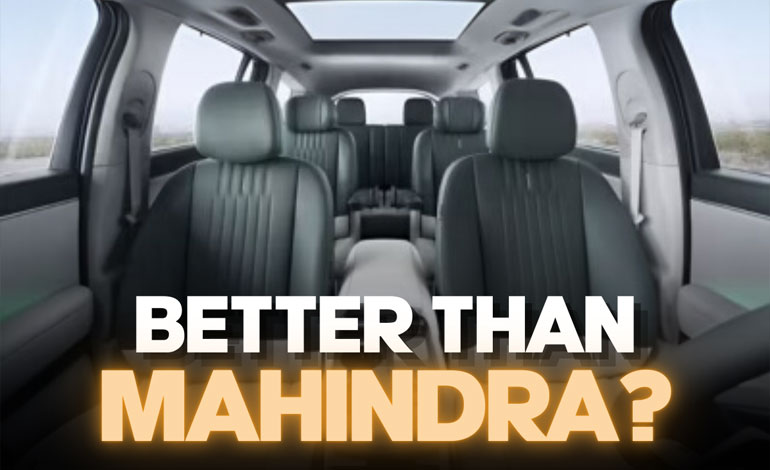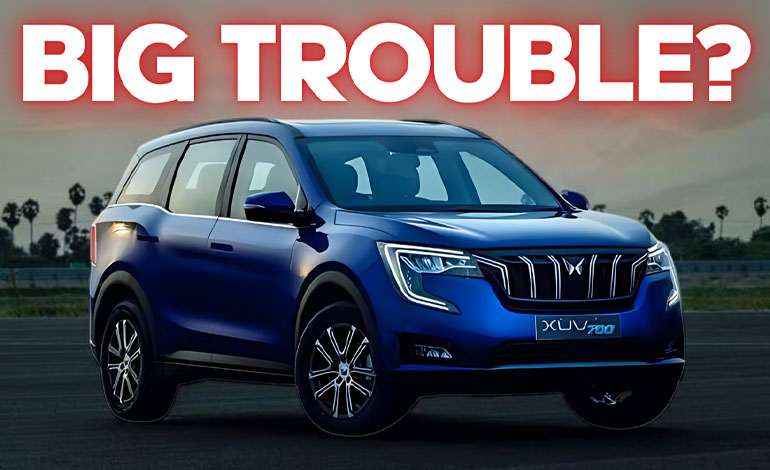Mahindra XUV700 Faces Tough Competition from This Upcoming Japanese 7-Seater SUV

The Mahindra XUV700 has been one of the most talked-about SUVs in India since its launch, offering a winning combination of cutting-edge technology, bold styling, and exceptional value for money. However, the XUV700 now faces stiff competition from a new and powerful contender: a Japanese 7-seater SUV that is set to shake up the market and give Mahindra a run for its money. But who is this rival, and why is it garnering so much attention? Let’s dive into the details and explore how this new player could potentially shift the dynamics in the SUV segment.
The Mahindra XUV700: A Market Leader with a Strong Following
Before we delve into the rivalry, let’s first take a look at what makes the Mahindra XUV700 such a formidable contender in the SUV market. Launched in 2021, the XUV700 quickly became a favorite among Indian consumers due to its impressive feature set, comfortable ride, and robust performance.
The XUV700 comes with a range of engine options, including a 2.0-liter turbocharged petrol engine and a 2.2-liter diesel engine, both offering strong performance and efficiency. It’s also packed with a host of advanced tech features, including a large touchscreen infotainment system, autonomous driving capabilities, and a stunning 360-degree camera for added safety.
Another highlight is the XUV700’s pricing. It offers a premium experience without a premium price tag, making it an attractive option for those who want a high-quality SUV without breaking the bank. With its combination of space, comfort, technology, and value for money, the XUV700 quickly captured the attention of families and tech-savvy consumers alike.
However, despite all its advantages, the XUV700 may soon have some serious competition on its hands from a new 7-seater SUV from Japan.

Enter the Japanese Rival: A New Contender in the 7-Seater SUV Space
While Mahindra has long dominated the Indian SUV market with its rugged, value-oriented offerings, Japanese manufacturers have a reputation for crafting well-built, reliable, and technologically advanced vehicles. One such manufacturer is Toyota, whose upcoming 7-seater SUV is expected to raise the stakes in this segment.
The Japanese 7-seater SUV, expected to be based on the Toyota Land Cruiser or a similar platform, has already generated a lot of buzz due to its potential to combine Toyota’s hallmark reliability with cutting-edge technology and comfort. While specific details about the vehicle are still under wraps, industry insiders and experts are confident that it will offer a compelling alternative to the Mahindra XUV700.
What Makes the Japanese 7-Seater SUV a Serious Competitor?
1. Unmatched Reliability and Durability
Toyota is renowned for producing some of the most reliable and durable vehicles on the planet, and their upcoming 7-seater SUV is expected to continue this tradition. Unlike some of its competitors, Toyota vehicles are known for their longevity, often clocking high mileages without major issues. For families looking for a long-term investment, this reliability could prove to be a key selling point.
In comparison, while Mahindra vehicles have certainly improved in terms of build quality over the years, they still don’t quite have the same reputation for long-term reliability as their Japanese counterparts.
2. Advanced Safety Features
Toyota’s commitment to safety is well-known, and their upcoming 7-seater SUV is likely to come loaded with advanced safety features. From autonomous emergency braking to lane-keeping assist and adaptive cruise control, Toyota’s safety tech is often among the best in the industry.
The Mahindra XUV700 also offers impressive safety features, including multiple airbags, stability control, and a 5-star Global NCAP rating. However, Toyota’s reputation for cutting-edge safety technology, particularly with their hybrid and electric models, could give them an edge, especially among safety-conscious buyers.
3. Hybrid Powertrain Option
While Mahindra has made strides in offering fuel-efficient diesel and petrol engines, Toyota is likely to offer a hybrid powertrain in its upcoming SUV. This could be a game-changer, especially given the growing interest in hybrid and electric vehicles. A hybrid option would allow Toyota to appeal to environmentally-conscious buyers who are looking for better fuel economy and lower emissions.
With fuel prices continuing to rise, hybrid powertrains are becoming an increasingly attractive option, and Toyota’s expertise in this area could help them capture a significant share of the market.
4. Interior Comfort and Space
Both the Mahindra XUV700 and the upcoming Toyota SUV are expected to offer spacious cabins with three rows of seating to accommodate seven passengers. However, Toyota has a history of creating interiors that prioritize comfort, with high-quality materials, ergonomic seating, and user-friendly layouts. Expect features like premium upholstery, ambient lighting, and intuitive controls.
The XUV700 is no slouch when it comes to comfort either, offering ample legroom, premium seating options, and a feature-packed cabin. However, Toyota’s commitment to interior quality and attention to detail may give it the edge in this department.
5. Global Appeal
While the Mahindra XUV700 has garnered praise in India, Toyota’s global reputation could allow its new SUV to reach a broader market. With a presence in multiple international markets, Toyota could position its 7-seater SUV as a global vehicle, appealing to buyers not only in India but also in regions such as the Middle East, Southeast Asia, and even parts of Europe.
Mahindra, on the other hand, has yet to make significant inroads into markets outside India, which may limit the global appeal of the XUV700.

The Competitive Landscape: How the XUV700 Stands Up
Despite the impending competition, the Mahindra XUV700 still holds a few trump cards. It is one of the most affordable 7-seater SUVs in its segment, offering exceptional value for money. In terms of features, the XUV700 is packed with technology that appeals to a younger, more tech-savvy audience, including AI-powered voice recognition and smart connectivity features.
Moreover, the XUV700’s rugged, bold design and off-road capability could make it an attractive option for buyers looking for a vehicle that can handle both urban commutes and weekend adventures.
Conclusion: A Battle of Features and Value
In the end, the competition between the Mahindra XUV700 and the upcoming Japanese 7-seater SUV will likely come down to a battle of features, pricing, and brand loyalty. Mahindra has already carved out a niche for itself in India with its blend of affordability, performance, and technology. However, the Japanese rival—likely Toyota—brings unmatched reliability, advanced safety features, and a potential hybrid powertrain, making it a formidable challenger.
Ultimately, the consumer will decide which SUV offers the best value based on their preferences for comfort, performance, and brand trust. Both vehicles are set to make waves in the 7-seater SUV market, and it will be exciting to see how this rivalry unfolds in the coming months. Whether you prioritize cutting-edge technology or long-term reliability, one thing is clear: the competition is about to get a whole lot fiercer!








